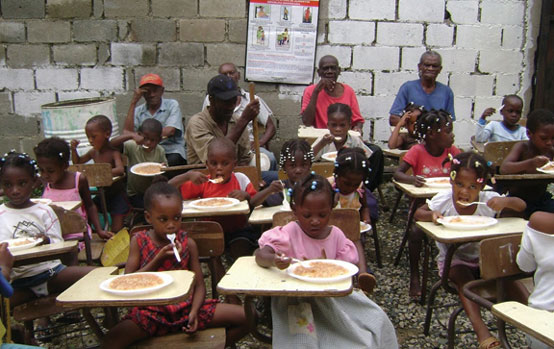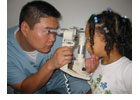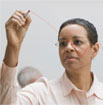More Help to More People: The Story of Capable Partners
| Social Change | |

Photo: Batey Relief Alliance. AED works to strengthen organizations like the Batey Relief Alliance, which provides health services to people living along the border of the Dominican Republic and Haiti.
In the company “towns” or bateyes that spring up around the sugar cane plantations on the border between Haiti and the Dominican Republic, migrant workers hack out a meager living. After long days in the field, workers have little access to adequate shelter and medical services. Addressing the needs of children and families in these bateyes is the mission of the Batey Relief Alliance.
Since its founding in 1997, the Batey Relief Alliance has partnered with local grass-roots groups and U.S. health care professionals to bring modern medical facilities and treatments to the bateyes along the border. From modest beginnings, the nonprofit has experienced rapid growth in size and scope. But, no matter how rewarding it has been, such growth has strained the organization.
 BATEY RELIEF ALLIANCE: A student with the Ohio College of Optometry tests a patient’s vision during a trip to santo Domingo with Batey Relief Alliance’s Blindness Prevention Program.
BATEY RELIEF ALLIANCE: A student with the Ohio College of Optometry tests a patient’s vision during a trip to santo Domingo with Batey Relief Alliance’s Blindness Prevention Program.“Batey Relief Alliance was founded from scratch,” said its CEO, Ulrick Gaillard. “It has grown tremendously in a short period of time, and we feel we lack the maturity as an organization to face our challenges in implementation, staff capacity, and fundraising.”
For many similar organizations, weak management systems and practices hamper their ability to fulfill their potential.
However, thanks to the USAID-funded Capable Partners Program, AED is sharing its expertise in capacity building, program implementation, and compliance with U.S. government policies and procedures with scores of service providers around the world.
Consequently, they can function more efficiently, serve as better partners with current and future donors such as the American government, and get more help to more people.
“Complying with U.S. government rules and regulations is complicated—the U.S. government purposely has very high standards of accountability and transparency because it has a duty to be a responsible steward of taxpayer funds,” said Barney Singer, a vice president with the AED Center for Civil Society and Governance and the director of the program. “So it can’t and won’t fund organizations that don’t meet certain criteria, even if they do great work.
“That’s why USAID asked us to help good organizations become more capable partners,” he said.
Survival Skills
A new Capable Partners initiative, the Development Grants Program, provides one to three years of technical assistance to nonprofits that USAID missions in Africa, Asia, Europe, and Latin America select as promising grant recipients, so these “partners” can manage their awards properly and be more productive.
Once selected, grantees attend a rigorous week-long “boot camp” led by AED in their region. There, regardless of sector, participants learn the nuts and bolts of being a successful USAID partner.
Following the workshops, AED helps grantees conduct self-assessments and create institutional improvement plans. Then, via customized technical assistance, AED works with grantees to strengthen the systems that will contribute to the long-term health of their organizations.
“The initial workshops teach the grantees what they need to know to survive in the field,” said Singer, who has conducted the workshops in Dakar, Kampala, Kiev, Pretoria, and Quito.
For the Batey Relief Alliance, which is receiving USAID funds for the first time, attending the Quito workshop answered many questions.
“New grantees have no clue about how USAID operates,” Gaillard said. “Had I not done the workshop, it would be virtually impossible to understand the USAID culture.”
Gaillard was referring primarily to USAID’s numerous financial reporting requirements, such as how to report travel expenses and process reimbursements, which aren’t necessary for the majority of the group’s donors. But that wasn’t all he gained.
“In Quito, we met with folks from Ecuador, Peru, and fellow people from Haiti; we exchanged ideas and our experiences working with our new partner, USAID,” he said. “We learned not just how to
Haiti
JUSTIN LYBERAL is the technical advisor for the New Partners Initiative.
Haiti has always been unique when it comes to development. So much donor money and so many organizations are here, which results in so much competition for these funds.
With the New Partners Initiative, a branch of the larger, USAID-funded Capable Partners Program, AED provides systems strengthening as well as HIV technical support to local organizations that are implementing activities under the U.S. President’s Emergency Plan for AIDS Relief, or PEPFAR.
A big challenge we’ve faced is that some people are afraid to change. We take a humble, non-threatening approach, and create a rapport so that they know we’re partners with them. We help them do assessments of their organizations, and the entire process is participatory and tailored to each individual’s needs. As a result, I’ve seen not just changes in systems, but changes in attitudes as well.
I love doing this kind of work. The program’s success is all about trust, because if you want sustainability, you have to have relationships.
Now our partners have more funding because of NPI. Absolutely they do. Plus, they are stronger organizations, with more experience, greater capacity, and an ability to adapt rapidly. As a result, they have found themselves in a better position to respond to this new reality we have in Haiti.
comply with minimum requirements, or how to maneuver within USAID regulations. I think beyond that, the workshop taught us how to become a stronger, more professional organization that feels comfortable in any funding capacity, with any donor.”
Strong Systems: ‘A Beautiful Thing’
Moving forward, AED will continue providing technical assistance to the grantees as they implement their improvement plans and USAID grants.
“It’s not enough to have a great program,” said Cate Cowan, a senior communications officer with the AED Center for Civil Society and Governance, who also works on Capable Partners. “You need strong organizations and systems to make programs truly great and take them to scale. If an organization has effective inventory management, for example, it can provide more food or medicine.”
For the Batey Relief Alliance, and those it serves, such improvements are invaluable.
“For five years we’ve been searching for an opportunity to work with a group that understands our culture and goals, to sit down with it one-on-one, and to receive help so we can meet those goals,” Gaillard said of his experience with AED. “And Barney [Singer] did that. He listened, gave credible assistance, and helped us draw a plan, bringing us to a different level of workmanship. It’s a beautiful thing.”
For more information, contact Barney Singer.
Capable Partners is a project in the AED Social Change Group which works to increase the effective participation of people in social change programs, with an emphasis on youth, health, HIV/AIDs, global climate change, environment, agriculture, and civil society and governance.


